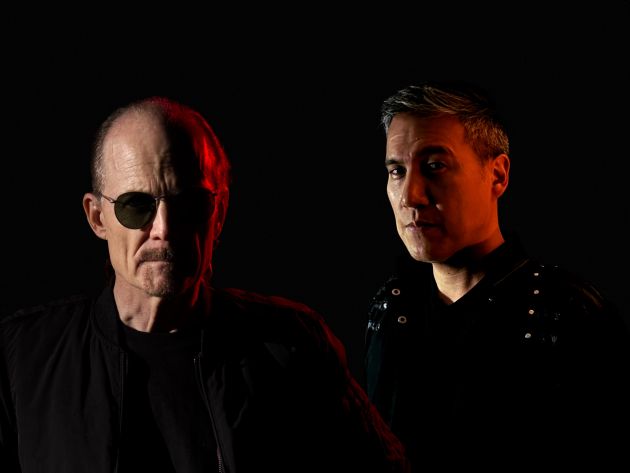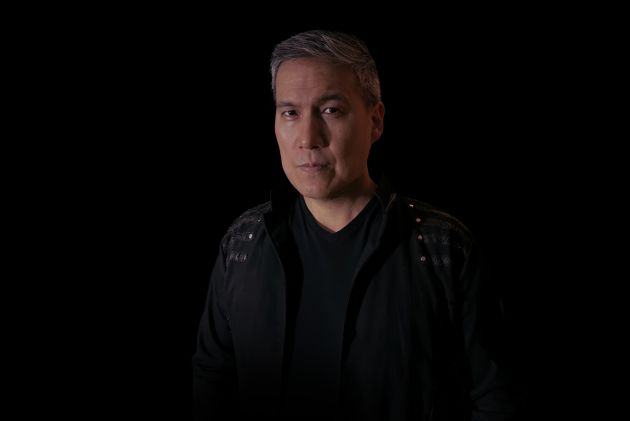 Interview with
Interview withDon Gordon (music & vocals) and James Mendez (music & vocals) from Data Void
DATA VOID emerged as a collaborative project between electronic music veterans Don Gordon and James Mendez, who have been acquainted for nearly three decades. Their paths first crossed in 1996 in Austin, Texas, during a tour featuring industrial heavyweights like NUMB, FRONT LINE ASSEMBLY, and DIE KRUPPS. However, it wasn’t until a serendipitous reunion in Ho Chi Minh City in late 2018 that the idea of working together musically took root. The duo’s creative synergy blossomed over shared conversations about music and a mutual admiration for each other’s work.
In June 2020, they decided to join forces on a song-writing experiment, which evolved into a full-fledged collaborative endeavour. This initial spark culminated in the birth of DATA VOID and their debut album, ‘Strategies of Dissent’, released in March 2024. ‘Strategies of Dissent’ serves as a sonic manifesto, blending Gordon’s penchant for dissonance, texture, and chaos with Mendez’s dark melodicism and rhythmic sensibilities. Through a meticulous process of remote exchanges and iterative refinement, they seamlessly blended their diverse musical styles, exploring themes of societal control, technological influence, and disinformation. Featuring dual vocals for added depth, their album serves as a poignant commentary on contemporary global realities, inspired by speculative literature and a shared vision for engaging listeners in profound reflection. Looking ahead, they hint at future projects and live performances, underscoring their enduring creative synergy and commitment to pushing artistic boundaries. About the origins of their collaboration, their creative process, and how they blend their unique musical styles and the themes of societal control, technological influence, and dissent that are reflected in their music, and more with James Mendez (JIHAD) and Don Gordon (NUMB)
Reflections of Darkness [RoD]: Why do two artists involved in two successful projects decide to start a collaboration together? How did your collaboration as DATA VOID come about, and what sparked the decision to work together musically after almost 30 years of knowing each other?
Don Gordon [DG]: After completing the ‘Mortal Geometry’ album, I was interested to do a collaborative project, so when James suggested we experiment with a track, it took off from there.
James Mendez [JM]: Looking back, the idea behind working together collaboratively sort of came second to initially reconnecting with Don in Nov 2018 after such a long break as you are aware of. We stayed in contact over email, which eventually led to video calls where we discussed many different subjects, with music being one of them. The idea behind collaborating on an initial track started with me asking Don if he would be interested in working on something together. Being very familiar with his work, I was curious to see how a collaboration consisting of our ideas coming from different backgrounds and influences would turn out. Without really knowing what would come from our initial exchanging of ideas, they would evolve into full-length songs as we continued the process until we eventually had enough songs for a full-length release.
RoD: Can you walk me through your creative process for ‘Strategies of Dissent’? How did you navigate blending your individual musical styles and influences to create a cohesive sound?
DG: The album was developed through the online exchange of audio and MIDI files and lots of discussion. The process would start with one of us sending a sketch of a groove or harmonic progression to the other person who in turn would use this as a creative jumping off point. The first couple of exchanges usually led to quite marked departures and evolutions from the original source idea. This meant that there wasn’t a lot of real-time interaction during the writing phase which could have been a problem but as it turned out, this iterative back and forth allowed for a more reflective approach to leading to the introduction of some unexpected ideas. After developing the main instrumental components of a song, I would write the lyrics and record a vocal. This was forwarded to James who would record an alternate variation. A final vocal would then be assembled by utilizing the most interesting parts from our different approaches. This worked well as it took advantage of our stylistic strengths and differences. In the end, some of the songs have the main vocal part being alternately delivered by James and myself in different parts of the song (i.e., ‘Crash’, ‘Burn’ & ‘Resurrect’), for others both of vocal approaches were integrated throughout the song, and in a couple songs there was only a single vocalist (i.e., ‘A Failure of Language’, ‘This Night Goes on Forever’). While I executed the final mixes, these too would undergo revision based on discussion. While our areas of shared experience and musical overlap provided a base from which to build, many of the more interesting and powerful aspects of ‘Strategies of Dissent’ arose out of our different creative processes and divergent musical references points. This set up a creative dynamic and tension that resulted in interesting and unexpected outcomes.

JM: All songs began with either Don or I sharing a few sequences which included a variation of textures / soundscapes, a bass line (at times), percussion, etc. Once received, the other person would then add additional parts that might include strings, more bass lines, additional drum programming and sequences, ideas, etc. We took an iterative approach with going back and forth until we refined all ideas / sequences and eventually structuring them into how we felt each song should be represented. During this process, we would share a combination of wav files (stems), MIDI files, screenshots of how each sequence / channel should be aligned and arranged within each of our DAWs (Logic Pro and Ableton Live) respectively. Reason being is because we both use different music software, so we had to make sure all channels were in sync for both of us as we continued working on each song. We would also discuss the arrangements of each addition in detail over email and video calls to help convey our thought process accurately. Once we felt the song was complete (rough draft), Don would then write lyrics, share them, along with a high-level sketch of how the vocals might be structured. Similar to the iterative music writing process, the vocals would undergo the same process with both of us sharing ideas on how they would be sung, layered, structured, etc. Regarding our individual music styles and influences being captured during this process; this came about by the (very) deliberate choice of sounds, textures, sequence programming, etc. For me, this was a very different experience (to also include working with another artist in general, as I haven’t done that in a very long time) because I spent a lot of time really focusing on what and how I would contribute to each song. I found myself deliberately not writing in the usual style I am used to and also not using the choice of sounds I would typically use for my project which would sometimes be challenging for me. In the end though, it was a really great experience for me as it pushed my writing abilities and taught me to work differently.
RoD: The album explores themes of societal control, technological influence, and dissent. How do you see these themes reflected in the current global landscape, and what prompted you to delve into them?
DG: It’s almost impossible not to have to engage with these themes as you are being exposed to and impacted by their consequences / implications on a daily basis. In several cases the lyrics almost wrote themselves as absurdist / contradictory / illogical actions and ideas are present everywhere you turn. Reality really has become much stranger than fiction. Lyrically and conceptually the album explores the themes of power, control and resistance to it, and the attraction for many to “lost causes” and conspiracies. Each song takes a different perspective, a different strategy if you will, to engaging with these themes. Not surprisingly, information spaces, misinformation, conspiracies, and technology figure prominently into this with most of the songs having their basis in contemporary events and social / political currents. JG Ballard summed it up nicely several years ago when he stated that “the advanced societies of the future will not be governed by reason. They will be driven by irrationality, by competing systems of psychopathology."
RoD: Your use of dual vocals adds depth and dynamism to the album. Can you tell me more about your approach to incorporating vocals into your music and how it contributes to the overall sonic experience?
DG: James has a more punctuated rhythmic vocal style whereas my vocals have a looser more intimate menacing quality. By incorporating both of these styles we were able to create a powerful contrast and dynamic in the vocal delivery. The use of two vocals also creates a sense of a dialogue or conversation taking place, which in a way invites the listener to participate.
JM: Don and I had different approaches to how we would record the vocal tracks for each of the songs. We would both record our own versions and then share them with each other which is how the ideas of structuring them (to include layering as well) would surface. The idea of incorporating a mixture of single and/or dual vocalist(s) throughout different parts of each song definitely adds an interesting dynamic that you typically don’t hear in this style of music (often) in my opinion.
RoD Collaborating with Craig Saunders (SHOKMACHINE) and Junior Guedes for your music videos seems to have been an enriching experience. How did you work with them to bring your vision to life, and what do you feel they brought to the project?
DG: Junior created a highly impressionistic response for the song ‘So Alien’, resulting in a unique interpretation that creates tension between the visuals and the lyrics for the viewer. Echoes of Hieronymus Bosch run through the filter of a psychotic AI trained on conspiracies and methedrine. In contrast, Craig had a well-defined visual aesthetic that utilizes AI software to develop his imagery. When we contacted him, we had a pretty good sense of what the outcome would be. We presented Craig with an outline of the themes and lyrics for the song ‘Nothing Changes’ and a very general sense of what we were hoping to see. While there were some iterative stages in the development, these were primarily around technical and visual considerations rather than thematic. The use of AI to generate the imagery creates an intended alignment and at the same time a tension / contradiction with the themes of technology and control explored on ‘Strategies of Dissent’. In addition to the two full-length videos, we also developed a number of short video “fragments” that presented an alternate visual aesthetic, one more directly informed by the band’s sensibilities. While these were used as short promotional visualizations, they were also intended to allude to the tendency for humans to detect patterns or meaning in meaningless data. This was one of the narrative ideas used by William Gibson in ‘Pattern Recognition’ and aligns nicely with concerns about data voids in the IT world.
JM: I agree, as I am a fan of both Craig and Junior’s work (musically and visually). Their respective contributions definitely added a unique level of artistic creativity that heightened our tracks visually. As far as how we worked with them, we shared each song (in advance) along with a short description of what each song represented and left it open for them to share their interpretations in each video they created. We then requested some minor changes or edits until we were happy with the end result. What I really appreciated most was how different each of their outcomes and perspectives were between what Craig and Junior created in the end.

RoD Your lyrics draw inspiration from literary figures like J.G. Ballard, George Orwell, and Aldous Huxley. How do you believe science fiction and speculative literature help you understand and navigate the complexities of our present reality?
DG: As a genre, science fiction / speculative fiction provides narratives for the reader to reconsider assumptions about yourself, society, and explore possible outcomes when social and technological change is taken to an extreme. That being said, science fiction has rarely been successful at accurately predicting the future. Its strength lies in getting the reader to consider underlying questions about our relationship with technology, its benefits and failures, and the social/political implications. Unfortunately, there is a tendency, including in the media, to view some well-known sci-fi works as though they were authoritative texts that outline inevitable outcomes. Recently, Orwell and Huxley have been referenced quite a bit, and while they present a number of interesting ideas, I’d argue that the mechanisms of control in the present day are far more sophisticated than imagined by these authors. Consumerism, entertainment culture, the commodification of nearly everything, and a willingness for individuals to voluntarily surrender control have proven to be a more useful approach than coercion. The creation of a permanent state of desire and dissatisfaction, distraction, seduction, trivialization, and the illusion of choice help sustain this. These more insidious and subtle mechanisms of control have been recognized by several other authors. Ballard’s stories often operate at a more individual level as they explore social, moral, and ethical dimensions. Philip K. Dick, Bruce Sterling, William Gibson, Isaac Asimov, and others, while less explicitly dystopian, also engage with the implications of societies organized around entertainment, where celebrity and entertainer status are seen as valid qualifications for senior leadership roles, where technological optimization rather than human factors shape society, and the implications of AI, among other issues; all of which resonate in the present day. Technologies and their related social issues, once solely the domain of science fiction, are currently playing out in real-time… AI, robotics use, tech-based surveillance societies, man-machine integration, climate disaster, significantly extended lifespans, and elite bunker building to weather the apocalypse are just a few examples. Unfortunately, the rate at which new technologies are being rolled out leaves little time to consider how best to integrate and mitigate their impact and, most importantly, who benefits. Clearly, the current agents driving these changes have little interest in addressing these issues. Good science fiction can help us frame the questions needed to more quickly develop answers to these concerns.
RoD The album also touches on the overwhelming nature of social interactions and disinformation in today’s society. How do you think these factors influence individual choices, actions, and freedoms?
DG: There is irony in a time when it seems we have more access to information and opportunities than ever before, we seem unable to make decisions. However, I think the issue is not that we really have more choice; it’s the illusion of choice and control through fragmentation, lack of overview and guiding principles, and absolutism, where every decision is seen as a zero-sum game that defines our identities. Making no choice becomes easier than possibly making the wrong one. While disinformation has always existed, its scope, ubiquity, and blatant detachment from reality amplify this paralysis.
JM: Everyone consumes and interprets (dis)information differently, considering how information is presented (accurately or not). This adds complexity, making it challenging to give a straightforward response. For instance, consider a situation where someone may have completely misunderstood some form of communication (written or verbal), requiring further explanation for them to understand the intended context or meaning. Now multiply this experience across society on a large scale, with each individual interpreting information—including the overall agenda, context, and meaning of such (dis)information. Effective communication, in general, can be complex. This leaves a multitude of outcomes that can be categorized into various groups, which may or may not include like-minded individuals, certainly making for interesting times as we see today. That said, it depends on how individuals genuinely interpret such (dis)information and how they choose to respond or not. Considerations include whether their response is purely self-centred, considers everyone around them, or truly understands the bigger picture or agenda before engaging.
RoD: In ‘Strategies of Dissent’, you address the perpetual cycle of war and its impact on humanity. What insights do you hope listeners gain from your exploration of this theme?
DG: The use of an external threat has long been a favourite strategy to divert attention, criticism, and accountability away from local issues and change economic dynamics. In many ways, it doesn’t matter if it’s a “hot” war as long as the perception of an existential threat persists. This use of “perpetual war” as a means of control was a key tool in Orwell’s ‘1984’, but its current implementation is far more multidimensional, nuanced, and less obvious. In an attention economy, the media present information as entertainment, alongside promoting unattainable desires through advertising. Its purpose is not to inform or educate. Decontextualized information snippets provide simplistic narratives with little context, no resolution, and promote a fragmented, ever-changing worldview. With a focus on headlines, we are directed to care about non-local events that have little direct influence and over which we have no control. Images from a perpetual cycle of war fit well into this media landscape by providing spectacle, narrative drama with “good guys and bad guys”, and promoting social cohesion through “us versus them”.
JM: If we are to learn anything from our past (war has been ongoing for thousands of years and will continue to persist), there will always be others in high-powered positions who want more money, power, and control in some form, regardless of how it appears, and who will never be satisfied. The sense of entitlement, disregard for others, and selfishness we see today is relevant and aligns with war, showing no shame, remorse, or embarrassment whatsoever. We will continue to see turmoil globally, as we always have. This isn’t to say there aren’t good people in the world. Unfortunately, there aren’t enough of those in high-powered positions with the ability to lead positive change.

RoD: You describe the album as a “soundtrack for the dispossessed”. What message or feeling do you hope listeners take away from experiencing ‘Strategies of Dissent’?
DG: I think that for many people, the changes over recent decades have increasingly driven a sense of frustration, undermining their ability to control change and delivering a future they were promised but will not receive. They (we) have become the ‘dispossessed.’ Some see this as a grand conspiracy, but sadly, I think it is more mundane - the inevitable outcome of self-interested agendas pursued by large institutions and individuals with excessive power, resulting in widespread social incoherence that benefits the few while harming most. The methods and systems through which control has been lost are obvious. To reverse this requires acknowledging these issues and how our actions have contributed.
JM: I genuinely hope that everyone who has taken an interest in our release (and those who may discover it) will thoroughly enjoy and appreciate the album in its entirety.
RoD: Looking ahead, do you see DATA VOID as a one-time collaboration, or can we expect more projects from the duo in the future?
DG: We’ve been considering a follow-up release (EP?) with new material and dub versions of some ‘Strategies of Dissent’ tracks. We are also exploring the possibility of performing live shows across Europe in the coming year.
JM: I am open to continuing the journey with Don in creating new music and exploring different avenues along the way





